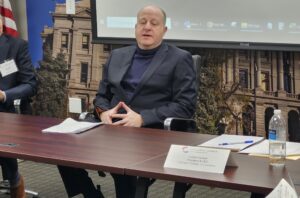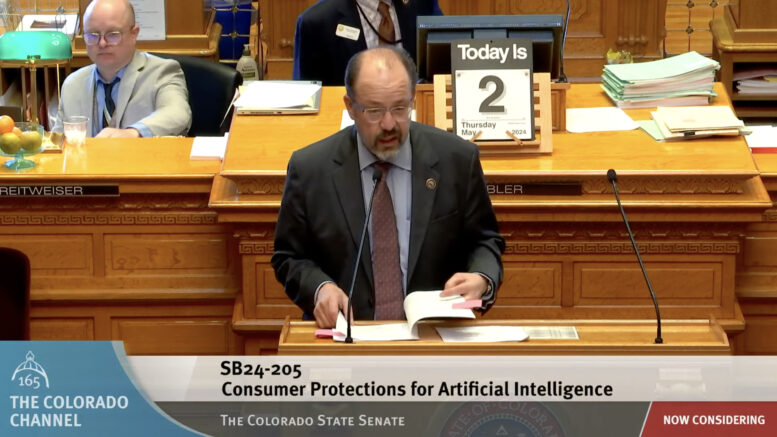Colorado Gov. Jared Polis has signed into law the nation’s first comprehensive attempt to regulate the development and deployment of artificial intelligence — but with major caveats that signaled discussions on how to implement the bill are far from over.
Polis on Friday inked Senate Bill 205, which launches a 21-month process to develop a framework for accountability for those who create and use the rapidly advancing technology, aiming to ensure programs do not contain built-in discrimination. Sponsored by Colorado Senate Majority Leader Robert Rodriguez, D-Denver, the bill applies only to “high-risk” programs making consequential decisions like loan approval, hiring determinations or medical-care decisions, but for them it requires much public disclosure.
It requires developers, for examine to disclose detailed information to deployers on how the AI systems were “taught”, provide documentation assessing discrimination risks, publish a statement summarizing the risk management of systems and inform the AG’s office of any discovery of significant risk of discrimination. And it requires deployers to implement comprehensive risk-management policies, conduct annual reviews to prevent algorithmic discrimination, notify consumers when AI is making consequential decisions and offer appeals processes to affected consumers.
SB 205 passed the House on a largely partisan 41-22 vote, with a half-dozen Democrats joining most Republicans in opposing it, and cleared the Senate by a heartier 28-7 tally, with one Democrat and six Republicans opposed.
Governor concerned about impact on AI sector
While Polis acknowledged the importance in trying to prevent discrimination and offer consumer protection, he said throughout a signing letter attached to the new law that he is worried that the regulations could stifle innovation in a burgeoning sector. As such, the Democratic governor wrote that he was signing the bill “with reservations” — and as an effort to jumpstart a conversation about AI regulations at the national level, which has not happened yet.

Gov. Jared Polis speak to a Colorado Chamber of Commerce board meeting in February.
Polis — himself a disruptive innovator in the dot-com sector in the late 1990s before entering politics — warned that the bill includes a “complex compliance regime” for developers and deployers working in Colorado. Developers’ reporting requirements to deployers and to the Attorney General’s Office are significant, as are requirements for direct notifications from deployers to consumers about how high-risk AI is used and the process of allowing consumer appeals of AI decisions.
Polis lauded the long rulemaking timeline before the bill goes into effect in February 2026 but warned that stakeholders must fine-tune the provisions of the bill in that time to ensure it doesn’t hamper development of expansion of new technologies. And he said that if the federal government does not pre-empt state efforts with a cohesive federal approach to the technology, the Legislature should craft a future bill that will amend SB 205 to conform with evidence-based recommendations for regulating the industry.
“I am concerned about the impact this law may have on an industry that is fueling critical technological advancements across our state for consumers and enterprises alike,” the governor wrote. “Government regulation that is applied at the state level in a patchwork across the country can have the effect to tamper innovation and deter competition in an open market.”
Why sponsor pushed so hard for passage
Rodriguez had worked closely with Connecticut state Sen. James Maroney to craft identical bills that would serve as a framework for regulation that could be used by other states or the federal government. However, as SB 205 was nearing its final votes, Connecticut Gov. Ned Lamont announced that he would veto that state’s bill if it landed on his desk, meaning Rodriguez faced the choice of killing his proposal or going it alone on the national scene.

Connecticut state Sen. James Maroney speaks on a virtual news conference in April that also features Colorado Senate Majority Leader Robert Rodriguez.
The Senate majority leader pushed ahead in the face of calls, including from the Polis administration, to turn his regulatory effort into a task force instead. One of his points of emphasis was the ability for the attorney general’s office — which expressed concerns opposite to those to the governor, testifying that it feared there was not enough guardrails in SB 205 — could take input over the next year-plus as it crafts the new rules.
“I know that … this is scary policy because we are in scary times with technology,” Rodriguez told the Senate on May 3 before it gave approval to SB 205. “Is this bill everything I wanted? No, this bill started with a much broader scope of technologies being contemplated … At the core of this bill is high-risk discrimination.”
Tech industry leaders working to protect AI industry
It’s not just Polis that has reservations as the bill goes into law. While many tech companies moved from opposing the bill to seeking amendments, almost all presented similar concerns that adding nation-leading reporting and accountability standards could scare entrepreneurs from starting or growing companies in Colorado.
Ruthie Barko, executive director of the Central U.S. for industry group TechNet, said she and other leaders worked with sponsors throughout the process to add amendments to avoid stifling Colorado’s growing innovation economy. While they made improvements, most of industry’s concerns remain, and even the long runway to implementation won’t change the fact that Colorado could still be an island of regulation if the federal government doesn’t act on this prodding, she said.
“Addressing AI’s risks is crucial for its responsible development,” Barko told The Sum & Substance on Monday. “But it must be done in a way that protects consumers without stifling innovation. We will continue to work with the governor and lawmakers to improve the bill in the months ahead.”
